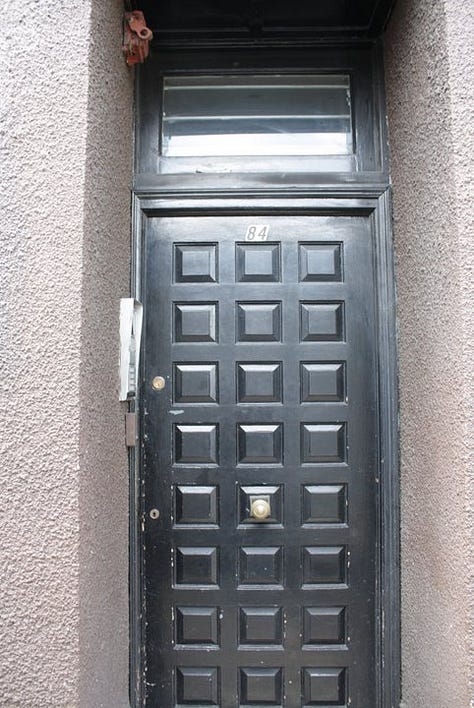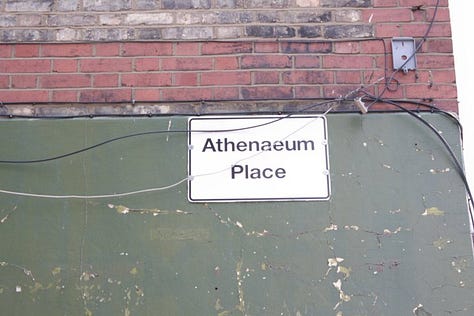The Kink Kronikles
The world in which I grew up is gone. That’s fine; it’s not necessarily a place to which I’d want to return. But there are aspects of it I can look back on with fondness, like my formative years as a music fan.
I never mastered how to pirate music, and I lacked an understanding of how P2P sites like Livewire or Kazaa worked. But I got a taste of it through MP3 files shared with me by my high school friends.
I’ve written before about what a game-changer getting a new PC was for me. The machine is partly to thank for the expansion of my music taste and for developing a network of friends and acquaintances online.
When not listening to low-bit-rate rips of my modest CD collection or songs sent to me by high school friends, I listened to AOL Radio. I was a classic rock guy, so I stuck with stations in that general era. I’m sure I heard The Kinks on one of those stations. I knew the basics, the early Shel Talmy-produced singles like “You Really Got Me” and the hits like “Lola,” but not much beyond that.
That began to change when I started living more of life online. I started blogging on LiveJournal at the invitation of the friend who shared his MP3s with me. I also created a Xanga. Neither of those exist anymore; I nuked them both sometime in the late 2000s. And while it might be nice to see how I thought twenty years in the past, it’s for the best that they’ve been wiped from the web.









It was on Xanga that I started finding kindred spirits. It was pretty popular at my high school in the days before MySpace when social media became more important to people my age.
It was an era of the internet in which each subculture had its own forum or webpage to socialize. It's not like it is now where we’re all on a handful of sites, forced to live alongside one another. There are pluses and minuses to that. You get a clearer picture of the world, but you might receive death threats for not being deferential enough to a K-Pop group, Taylor Swift, Beyoncé, Kamala Harris, or any other artist with a sensitive fanbase.
On Xanga and Livejournal, you made friends through blog rings and communities. On both sites, I made friends with people who lived across the country. Many of them had similar tastes in music. On Xanga, you could modify the HTML code for your blog to change its appearance, add widgets to it, and even get it to play a song of your choice. One of my Xanga friends blogged about The Kinks frequently, and the music that played on their page was “Waterloo Sunset.” The first time I heard it, I thought it was the most beautiful song I’d ever heard. I still believe that from time to time.
That was in the era when MySpace was starting to become big and before YouTube was on my radar. That site was a game changer. Suddenly, it was more accessible than ever to be able to find songs. It felt more honest and less risky than a P2P program.
It was also before streaming platforms like Spotify, Tidal, or Apple Music existed. There was Pandora, but it lacked the level of control the other three had.
If you wanted to hear music, you’d best bet was a record store. At the time, I wasn’t aware of the record stores in Indy, so I’d shop at Best Buy or Borders. The first Kinks CD I ever owned was The Ultimate Collection. I found it at either Best Buy or Borders. Either would track with my buying habits then. Borders, I’d found to have a good Kinks selection, going beyond the compilation albums to their studio albums, including the more obscure 70s LPs Preservation Act 2 or Schoolboys In Disgrace.
My music taste was self-taught primarily but I had several high school teachers take me under their wing and share their love of music. They’d burn me albums like Aftermath or, in the case of one teacher, basically all The Kinks albums I needed: Face to Face, Something Else, Arthur, Lola, and Muswell Hillbillies. A pretty remarkable run of albums, ones that really showcase the brilliance of Ray Davies.
The versions he gave me had the original album and many bonus cuts. And as any Kinks fan knows, that’s the most fun thing about their discography. You never know what obscurity on a deluxe reissue will strike your fancy. Favorites of mine include “Lincoln County,” “Mr. Shoemaker’s Daughter,” “Barclay Mews,” and “Mr. Songbird.” I’d argue that the songs they left off Village Green Preservation Society are as good if not better than the ones that made the record.
He joked that bestowing that on me hinged on me memorizing all my lines. He was responsible for the music for transitional scenes. It was almost entirely 60s pop, the psychedelic side of things. Except “She’s Electric” by Oasis. I mention that because the post-chorus resembles the chorus of The Kinks’ “Wonderboy.”
The Kinks are a major influence on Britpop and it’s especially fitting for Oasis as they too were driven creatively by a pair of brothers whose relationship could clip into contentiousness at times.
Another teacher burned me a copy of Ray Davies’ solo album, Other People’s Lives. Great title that really sums up Ray as a songwriter. He is known for his character sketches like “Dedicated Follower of Fashion,” “A Well-Respected Man,” or “David Watts.” He is an observer of the human condition, not a participant.
“Waterloo Sunset” is the perfect encapsulation of that. The narrator observes lovers meeting. The Terry and Julie in the song are often thought to be actors Terrence Stamp and Julie Christie, but Ray said that’s not the case. It’s a very beautiful and sad song, inspired by Ray’s stay in a hospital when he was 13.
“I didn't think to make it about Waterloo, initially, but I realized the place was so very significant in my life. I was in St. Thomas’ Hospital when I was really ill [when he had a tracheotomy aged 13], and the nurses would wheel me out on the balcony to look at the river. It was also about being taken down to the 1951 Festival of Britain. It's about the two characters – and the aspirations of my sisters' generation who grew up during the Second World War. It's about the world I wanted them to have. That, and then walking by the Thames with my first wife and all the dreams that we had,” said Ray in a 2011 article in The Independent.
That first wife, Rasa Didzpetris, provided backing vocals on several songs on Something Else, including “Waterloo Sunset.” When she left with the kids in the summer of 1973, he attempted suicide.
He recounted the experience in X-Ray, his “unauthorized autobiography.”
“Every song seemed to resonate inside Raymond Douglas. He sang songs like ‘Holiday’, ‘Celluloid Heroes’, ‘You Really Got Me’, ‘All Day and All of the Night’. Each song had a meaning about his own life. There was obviously a lot of self-pity involved, but he could not escape these emotions, there was no escape, this was the real world come tumbling down on Raymond Douglas' fantasyland. At the end of the concert he announced that this was the final concert by the Kinks, but the PA company accidentally turned off the sound system, and so nobody heard the resignation speech. It would have ended with 'The Kinks are dead, I am dead.’ Well-meaning people helped R.D. away from the stage, but he wished that he had just died.”
Ray was still wearing his stage makeup when he checked into the hospital. Some accounts remember him dressed as a clown when he informed the nurse. “Hello my name is Ray Davies. I am the lead singer of The Kinks. And I am dying.”
But Ray said differently in a 2005 interview with Q.
“Because I'd just come offstage and sunk a bottle of downers because I wanted to kill myself. Then I changed my mind. I was dressed as a dandy, it might have looked like a clown to everyone else. But even clowns can have bad days. I didn't have time to change because I would have died. Was it a cry for help? No, I liked that outfit.”
Ray has tackled his relationship with his brother Dave in several songs, like “Two Sisters” and “Hatred (A Duet).” In the former, he recounts a story of two siblings; one gets married early on and settles down, while the other one goes out and enjoys the life of a young single woman. Ultimately, she realizes she is happy with her life and no longer envies her sister.
It’s like how Brian Wilson wrote about surfing culture without taking part. He could live vicariously through his brother Dennis. Wilson is another June Gemini who understands the perils of making music with family and how even that is not enough to overcome creative differences.
It was the dynamic between the brothers that really drove the band and ultimately led to their demise. Ray is introspective and eccentric, and Dave is a true rock star with the hair and lifestyle to go with it.
The brothers have been that way since birth. Though Ray is the elder brother, before Dave came along, he was the youngest of the family and had six older sisters. The youngest sibling receives a certain amount of attention within a family, and when Dave arrived three years later, Ray felt that he took some of the spotlight off of him.
Ray was the band's driving force, singing lead on most of the songs and writing most of them. But Dave brought innovation to their sound. He cut the cones of his speaker with a razor blade, which gave “You Really Got Me” a sound that made it stand out. He was a singer and songwriter as well. Some of the best Kinks deep cuts were penned by Dave, some for the band and others intended for a solo career.
When I was a senior in high school, I spent an unforgettable Valentine’s Day with my friend. He accompanied me to Borders so I could finally get The Kinks Are The Village Green Preservation Society on CD. Afterward, we went to the theater I worked at to watch Catch and Release, mainly because Kevin Smith had a small part. It was also pretty funny for two single dudes to see that particular movie on that particular day.
When I was in college, some friends and I took a trip to see Indiana University play Purdue University for the Old Oaken Bucket in their annual rivalry game. The Hoosiers got destroyed, as is typical in football, so we left the game early. It was the 40th anniversary of the release of The White Album and The Village Green Preservation Society. It was also the 45th for With The Beatles and the day John Kennedy died.
When I picked up the Picture Book box set, the woman working the register at Luna Music started talking to me about it. I felt on the defensive because years prior a clerk at Best Buy had laughed openly at me buying a Beach Boys compilation so I was worried history was repeating.
I had that on my iPod when I was on a three-week European trip. I became really enamored with “Sweet Lady Genevieve” and listened to it often. Sometime during college, an internet friend who loved The Kinks had hooked me up with some more Kinks albums, the stuff from the mid-70s and beyond. The stuff the truly hardcore fans love.
When I applied for graduate school, I wrote a paper about the use of drone in “See My Friends,” one of the earliest times I did any musicological writing.
After the spring semester of my senior year of college, I participated in a three-week study abroad program on The Beatles with the same professor I’d served as grading assistant for. And though that role had ended, I unofficially served in the capacity for the trip. The first two weeks were spent in London and the last in Liverpool. As part of the class, we were tasked with reporting on another British artist. The stipulation was that we needed to visit the place they had originated and write up a report.
It was an easy choice for me; I picked The Kinks. So, I went up to Muswell Hill to see where it all began. I visited the site of their very first gig, The Archway Tavern, which appears on the cover of Muswell Hillbillies. I visited Konk Studios and even saw the parking lot where the supermarket used to stand, which had been a bowling alley before that and a Palais before that. The parking lot was now a supermarket again, a Sainsbury’s.
In my first year in Brooklyn, I got tickets to see Ray Davies perform at the Beacon Theatre. He played a lot of Kinks deep cuts as well as some of his solo material. The set list alone is astonishing, and it was a very life-affirming evening.
One of the classes the professor I worked for taught was History of Rock Part II, and one week of the syllabus was dedicated to The Who and The Kinks. Because of my love for them and extensive knowledge of them, he was kind enough to let me talk a little about them to the class. It is one of my many moments demonstrating what a stand-up guy he is.
I see many parallels between the two bands. Shel Talmy produced some of their earliest hits, and their guitar sound was a big part of their early appeal. Both acts are very English, particularly The Kinks, and they were driven creatively by a talented songwriter whose songs chronicle the misfits and eccentrics. And, of course, both groups dabbled with concept albums. In many ways, they are distant cousins or dialects of the same language. They have some similarities, but ultimately, they are their own thing.
In the music of Townshend and Davies, there is a deep sense of empathy, a desire to connect with others, and a desire to surmount alienation to lead a more fulfilled life. It’s no wonder both acts influenced all that was to come down the pipeline. They gave punk its fangs but also its heart.
The Kinks celebrated 60 years last year, and there are once again rumors of new music and a potential reunion - Ray and Dave seem to be on better terms than in the past - but even if they never play another note together or release a new song, their legacy is secure for the effect they’ve had on me and other like-minded misfits. While it’s great to feel understood by the words and music from your speakers, it’s another to encounter that in another. Their legacy is the love and friendships that their music has inspired. That would please Ray; he’s always been interested in other people’s lives.







